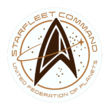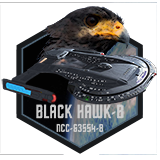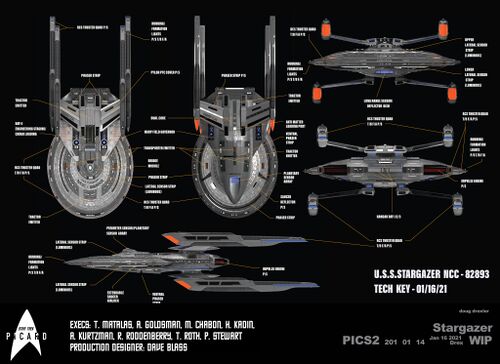More actions
Greenfelt22 (talk | contribs) No edit summary |
Greenfelt22 (talk | contribs) mNo edit summary |
||
| (One intermediate revision by the same user not shown) | |||
| Line 35: | Line 35: | ||
These are the technical specifications for the Sagan-Class [[USS Delphinus (NCC-82847)]]. | These are the technical specifications for the Sagan-Class [[USS Delphinus (NCC-82847)]]. | ||
[[File:Sagan-class-orthos.jpeg|500px]] | |||
= Design Overview= | = Design Overview= | ||
| Line 168: | Line 170: | ||
== Shuttlecraft == | == Shuttlecraft == | ||
== Lifeboats == | == Lifeboats == | ||
Latest revision as of 10:42, 16 September 2024

|
25TH CENTURY CONTENT The information presented below applies only to the USS Delphinus Sim. |

|
WORK IN PROGRESS This article is currently being compiled for review. Please check with administration to determine its accuracy. |
| File:Sagan class.png | |
| USS Delphinus | |
| Class Information | |
| Role: |
Cruiser |
| Decks: |
16 |
| Cruising Speed: |
Warp 9.5 |
| Personnel | |
| Total Compliment: |
310 |
| Tactical Systems | |
| Energy Weapons: |
9x Type-XIV Phaser Arrays |
| Torpedo Launchers: |
8x Type-I Variable Payload Torpedo Launchers |
| Shields: |
Regenerative/Multiphasic |
| Template:Shipclass | |
These are the technical specifications for the Sagan-Class USS Delphinus (NCC-82847).
Design Overview
- Coming Soon
General Information and Layout
Crew Breakdown
The Delphinus currently holds 310 crew and 10 civilian passengers.
- Officers: 78
- Enlisted: 232
- Civilians: 10
- Emergency Capacity: 1,000 souls
Departmental Breakdown
| OFFICERS | ENLISTED | TOTAL | |
| COMMAND | |||
| OPERATIONS | |||
| ENGINEERING | |||
| SECURITY/TACTICAL | |||
| MEDICAL | |||
| SCIENCE |
Measurements
- Length: 540.7 meters
- Beam: 245 meters
- Height: 90 meters
- Mass: 4,500,000 metric tons
- Number of Decks: 16 plus Upper and Lower Pod Decks
Propulsion Systems
Warp Drive
- Coming Soon
Impulse Drive
- Coming Soon
RCS Thrusters
- Coming Soon
Tactical Systems
Defensive Systems
- Coming Soon
Offensive Systems
Phasers
- Coming Soon
Torpedoes
- Coming Soon
Sensor Systems
- Coming Soon
Long- and Short-Range Sensors
- Coming Soon
Primary Systems
Computer Systems
- Coming Soon
Environmental Systems
- Coming Soon
Transportation Systems
- Coming Soon
Communications Systems
- Intraship Transmissions: Voice and Data
- Personal Communicator Range: 850 km
- Ship to Ground Range: 20,000 - 64,000 km
- Communications Speed: 20.9 kiloquads/second
- Subspace Speed: 9.9997 warp
Communications systems aboard the USS Delphinus are typical divided into three key areas; intraship communications, ship-to-ship, and ship-to-ground. Communications is an important system that allows not only the crew of the Delphinus to stay in contact with one another, but also allowing for contact with Starfleet Command.
Intraship Communications can be accomplished either by voice or data. Both methods are directed and managed by the main computer. A large co-processor located in the secondary and primary cores receives, analyzes, and redistributes information at rapid speed, allowing for almost near-instant communication. The communications processors are connected to a series of 3,200 terminal node devices located throughout the ship.
Ship-to-ship communications involves the transmission of data between to or more starships or starbase-like facilities. Transmissions are sent via several long-range subspace transceivers located along the hull. Typical data transmissions of this type include general communication, messages, sensor logs, and tactical information. The subspace transceivers are also capable of receiving communications by utilizing their subspace antennas.
Ship-to-ground communications are accomplished much like the Ship-to-ship communications are. However, they make use of the short-range subspace transceivers. Short-range transceiver's range is generally between 20,000 and 60,000 kilometers. Ships generally don't orbit below 20,000 km. Thanks to recent advances in transceiver technology, the limits of transmissions have been extended. Should a ship need to contact a planet from over a distance of 64,000 km, the long-range transceivers would be used much like how ship-to-ship communications are carried out. Ship-to-ground communications are typical used for contacting planets in which the ship is in orbit of. It is also frequently used to monitor and stay in contact with any away teams that may be down on the planet.
Communications between two or more crewmembers, whether they are both on the ship, or both on the planet are handled by devices called communicators (or sometimes comm badges). These small devices shaped as the Starfleet logo are worn by Starfleet personnel at all times. Each communicator contains a small power supply and transceiver/receiver technology. The device is activated by simply tapping it and then communicating with another individual by voice. Communicators are the most often used way for personnel to stay in contact with each other. They are also useful during away missions because transporters can get an easy lock on them, should they need to beamed back aboard the ship.
Security personnel can monitor any communication sent to and from the Black Hawk. The exception to this is any transmission that has been encoded using advanced sets of Starfleet encryption protocols. Typically, messages of important nature from Starfleet Command are for the captain?s eyes only.
Support Craft
Shuttlecraft
Lifeboats
- 71x Lifeboats
Credits
The above information was adapted from the A Call To Duty Website on the Akira-Class starship.
| USS DELPHINUS LINEAGE | |
| SHIPS TO BEAR THE NAME | USS Delphinus • USS Delphinus-A • USS Delphinus-B • USS Delphinus-C |
| NOTABLE CREW MEMBERS | Philip Lovell • Zachary O'Connell |

